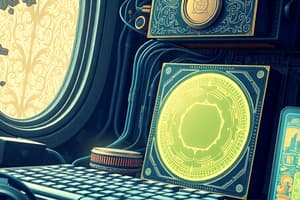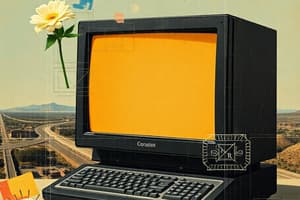Podcast
Questions and Answers
What is the function of computer hardware?
What is the function of computer hardware?
- Interpreting and executing instructions
- Executing software instructions
- Storing and retrieving information
- Manipulating data using electrical signals (correct)
Which component is often referred to as the brain of the computer?
Which component is often referred to as the brain of the computer?
- Memory (RAM)
- Motherboard
- Processor (CPU) (correct)
- Hard Drive
What determines the performance and efficiency of a CPU in processing data?
What determines the performance and efficiency of a CPU in processing data?
- Size of the monitor
- Memory capacity
- Number of input/output ports
- Clock speed (correct)
Which component stores and retrieves information in a computer system?
Which component stores and retrieves information in a computer system?
What category do monitors, printers, and keyboards fall into in relation to computer hardware?
What category do monitors, printers, and keyboards fall into in relation to computer hardware?
What is the primary function of the Central Processing Unit (CPU)?
What is the primary function of the Central Processing Unit (CPU)?
What is the function of RAM in a computer system?
What is the function of RAM in a computer system?
Which hardware component converts AC power from the wall outlet into DC power for the computer's components?
Which hardware component converts AC power from the wall outlet into DC power for the computer's components?
What is the main function of a Graphics Processing Unit (GPU) in a computer?
What is the main function of a Graphics Processing Unit (GPU) in a computer?
Which component allows a computer to connect to a network and access the internet?
Which component allows a computer to connect to a network and access the internet?
What is the primary function of the motherboard in a computer system?
What is the primary function of the motherboard in a computer system?
Which hardware component allows users to interact with computers by providing information about user actions?
Which hardware component allows users to interact with computers by providing information about user actions?
Flashcards are hidden until you start studying
Study Notes
Introduction to Computers and Their Components
Computers are sophisticated electronic devices that manipulate information using electrical signals. They consist of two primary types of elements: hardware and software. Hardware refers to the physical components of a computer, while software encompasses the written, machine-readable instructions that instruct hardware what to do. Understanding the basic concepts of computer hardware and its components is crucial for anyone interested in computers, whether they are end-users, technicians, or professionals working in related fields.
Computer Hardware
Hardware is a critical part of every computer, responsible for performing tasks dictated by the software. It includes a wide range of components, from the motherboard and processor to input/output ports and peripherals like monitors, printers, and keyboards. Each component has its specific role and contributes to the overall functionality of the system.
Processor (CPU)
The Central Processing Unit (CPU), often considered the brain of the computer, is responsible for executing instructions stored in memory. It interprets and manipulates data according to these instructions, performing calculations, running programs, and managing system tasks. The CPU's clock speed determines its performance and efficiency in processing data.
Memory (RAM & Hard Drive)
Memory components, such as Random Access Memory (RAM) and hard drives, store and retrieve information. RAM is temporary storage that holds the current state of the computer and is used by the operating system (OS) and applications to perform tasks quickly. In contrast, a hard drive provides permanent storage for the OS, files, and other data, with different formats like magnetic or solid-state technology.
Input/Output Ports
Input/output ports allow computers to interact with external devices like keyboards, mice, printers, and monitors. These ports can be wired or wireless, using various connectors like USB, HDMI, or Ethernet. They enable the exchange of data between a computer and its peripherals.
Power Supply and Cooling
A computer's power supply unit (PSU) converts the AC power from the wall outlet into DC power that the hardware components can use. Cooling systems, such as heat sinks and fans, dissipate heat generated by the CPU and other components to maintain optimal operating temperatures.
Graphics Processing Unit (GPU)
The GPU is a specialized chip that accelerates the processing of graphical information, often working in conjunction with the CPU to render images and video. Its capability is crucial for tasks like gaming, video editing, and scientific simulations.
Network Interface Card (NIC)
A Network Interface Card (NIC) enables a computer to connect to a network, allowing it to communicate with other devices and access the internet. It can be integrated into the motherboard or installed as an additional component.
Operating System (OS)
The operating system is a crucial piece of software that interacts with the hardware components, managing tasks, and providing a platform for users to interact with the computer. Examples include Windows, macOS, and Linux.
Hardware Components in Depth
Each component in a computer system serves a specific purpose, contributing to the overall functionality of the system.
Motherboard
The motherboard is the main circuit board that holds other essential components like the CPU and RAM. It connects these parts together using wiring or buses to facilitate communication between them. The layout of a motherboard varies depending on the specific hardware configuration of the system.
Input Devices
Input devices allow users to interact with computers by providing information about user actions, such as typing on a keyboard or moving a mouse cursor. Common input devices include keyboards, mice, touchscreens, and microphones.
Output Devices
Output devices display or reproduce the results of computer processing for human consumption. Examples include monitors, printers, speakers, and projectors. They convert processed data into a format suitable for end-users to access.
Conclusion
Understanding the fundamental concepts of computer hardware and its components is an essential foundation for anyone interested in computing. This knowledge enables users to troubleshoot issues, upgrade components, and maintain their systems effectively. As technology continues to evolve, staying informed about the latest developments in hardware will remain vital for both personal and professional growth in the field.
Studying That Suits You
Use AI to generate personalized quizzes and flashcards to suit your learning preferences.




